Table of Contents
Key Metrics to Track
Frequently Asked Questions
Choosing the Right AI Chatbot Platform
Buyer Overview
AI chatbots have evolved far beyond simple rule-based responses to become sophisticated conversational agents. The evolved chatbots can handle complex customer interactions, integrate seamlessly with business systems, and provide personalized experiences at scale. The chatbot market has matured significantly, with advanced platforms now offering genuine natural language understanding and complex workflow automation capabilities.
According to Ayudo's platform performance data, AI-powered chatbot implementations deliver:
- 42% faster resolution with agent productivity improvements
- 60% better deflection rate for routine inquiries
- 25% lower cost per resolution through intelligent automation
- 24/7 availability without proportional staffing increases
The most successful chatbot implementations combine advanced natural language processing with intelligent workflow automation, creating support experiences that feel natural and genuinely helpful while seamlessly escalating complex issues to human agents.
Key Challenge:
Many businesses struggle with choosing between basic chatbot builders and enterprise-grade conversational AI platforms, often underestimate the importance of advanced NLP capabilities, integration flexibility, and scalable architecture.
Understanding Different Types of AI Chatbot Solutions
Basic Chatbot Builders
Entry-level platforms designed for small to medium businesses with straightforward automation needs and limited technical requirements.
Core Capabilities:
- Drag-and-drop conversation flow builders
- Basic natural language understanding
- Simple integrations with popular platforms
- Template-based quick setup
Best For: Small businesses, startups, or organizations with simple FAQ deflection needs
Advanced Conversational AI Chatbots
Sophisticated platforms that leverage advanced NLP, machine learning, and enterprise integrations for complex customer service automation.
Core Capabilities:
- Advanced natural language processing and understanding
- Multi-turn conversation handling with context retention
- Enterprise system integrations (CRM, helpdesk, databases)
- Intelligent routing and escalation workflows
- Analytics and conversation insights
Best For: Medium to large enterprises requiring sophisticated automation and seamless human handoffs
Industry-Specific Chatbot Platforms
Specialized solutions built for specific industries like e-commerce, healthcare, or financial services with pre-built workflows and compliance features.
Core Capabilities:
- Industry-specific conversation templates
- Compliance and security features (HIPAA, PCI-DSS)
- Specialized integrations for industry tools
- Pre-trained models for industry terminology
Best For: Organizations in regulated industries or those with highly specialized use cases
Omnichannel Chatbot Platforms
Comprehensive solutions that provide consistent chatbot experiences across websites, mobile apps, social media, and messaging platforms.
Core Capabilities:
- Multi-channel deployment and management
- Unified conversation history across channels
- Channel-specific optimization
- Centralized analytics and reporting
Best For: Businesses managing customer interactions across multiple digital touchpoints
Head-to-Head Comparison: Top AI Chatbot Platforms
Yes
Limited
Yes
SMB Focus
SMB Focus
Limited
Yes
Yes
Yes
Yes
SMB Focus
Detailed AI Customer Service Chatbot Platform Analysis
As you see, in the earlier comparison table, there are more than a few AI customer service chatbots that you can choose from. This guide intends to make this evaluation less overwhelming for you. Here is a detailed analysis for you.
1. Ayudo - Advanced Workflow Automation
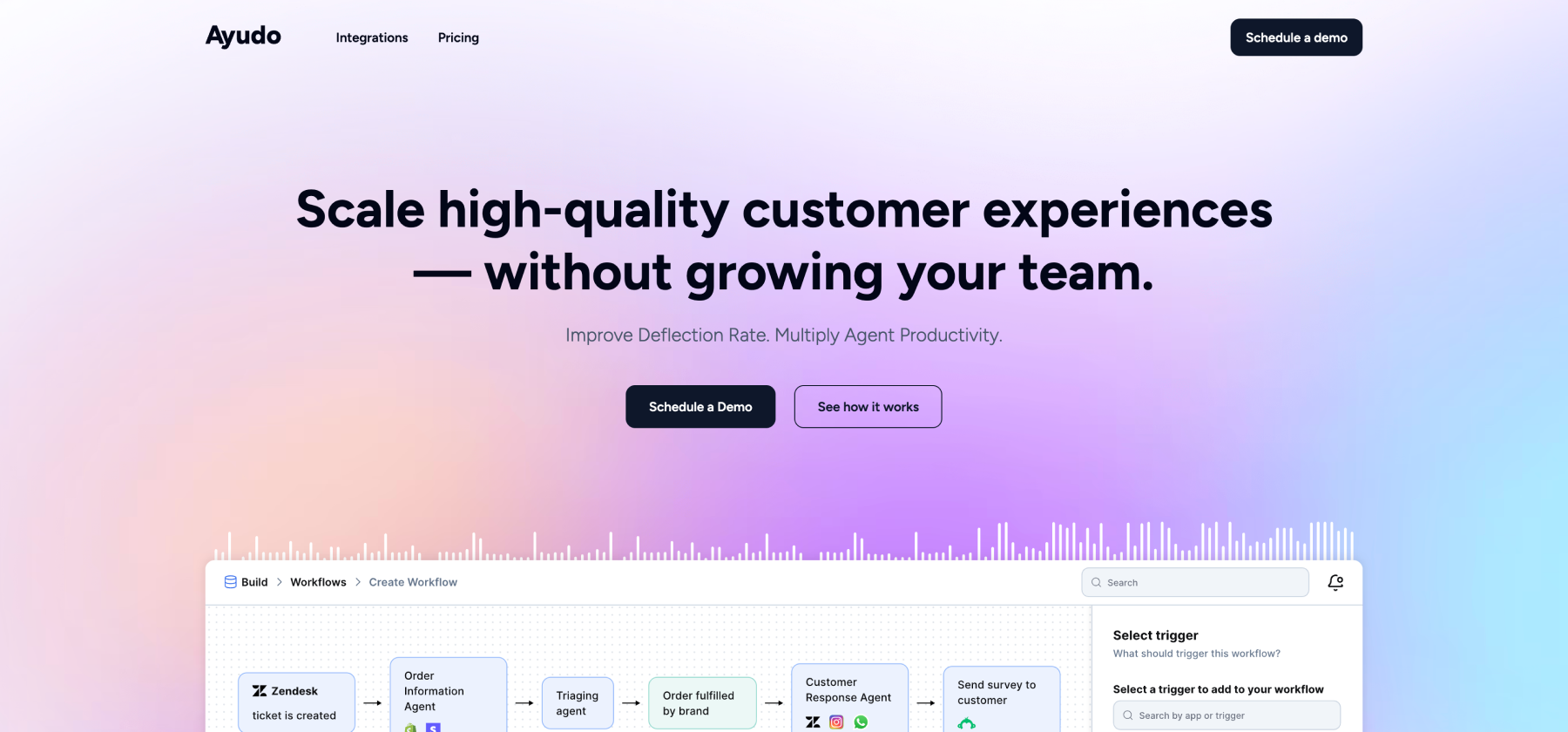
Best for: Companies needing sophisticated multi-agent workflows with rapid deployment. It works on top of any other helpdesk platform too.
Strengths:
- Launch trained AI workflows in under 60 minutes
- Advanced multi-AI agent collaboration for complex scenarios
- Extensive integration ecosystem (2700+ apps)
- Real-time knowledge synchronization
- Enterprise-ready security and compliance
- Seamless voice and text capabilities
Considerations:
- Newer platform with growing ecosystem
- May be over-engineered for simple FAQ bots
- Medium pricing point
Chatbase - Document-Powered Chatbots

Best for: Businesses wanting to quickly create chatbots from existing documentation
Strengths:
- Extremely fast setup (upload documents and deploy)
- Simple, user-friendly interface
- Affordable pricing for small businesses
- Good for knowledge-based Q&A scenarios
Limitations:
- Limited workflow automation capabilities
- Basic integration options
- Not suitable for complex customer service processes
- Limited customization options
- Minimal analytics and reporting
Fin.ai (Intercom) - Integrated Conversational AI
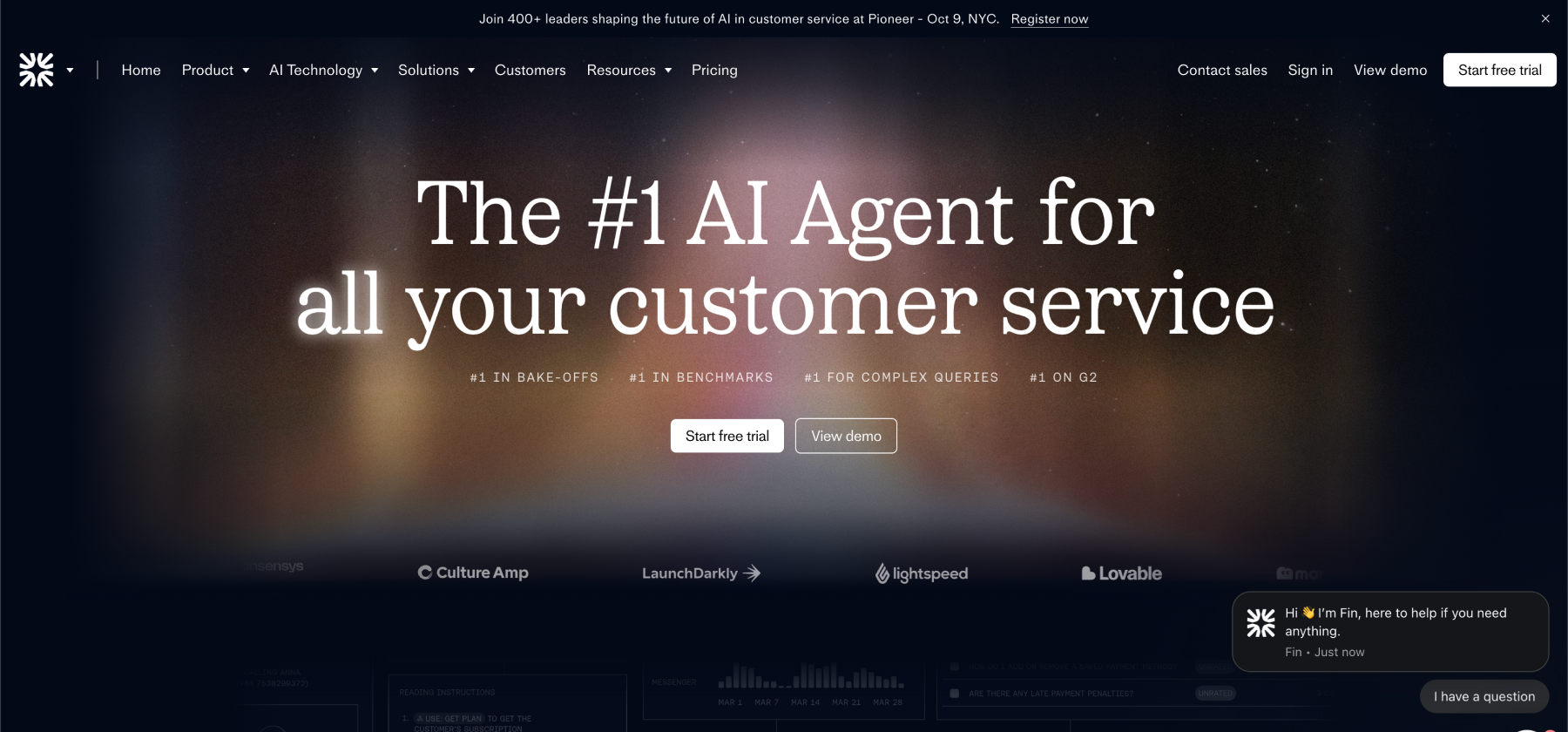
Best for: Existing Intercom customers wanting native AI capabilities
Strengths:
- Deep integration with Intercom's platform
- Advanced conversation handling
- Strong analytics and reporting
- Mature platform with extensive features
- Good human-AI collaboration
Limitations:
- Expensive, especially for larger teams
- Requires Intercom ecosystem commitment
- Limited standalone functionality
- Complex pricing structure
- External integrations are very limited.
Freddy (Freshchat) - CRM-Integrated Chatbot
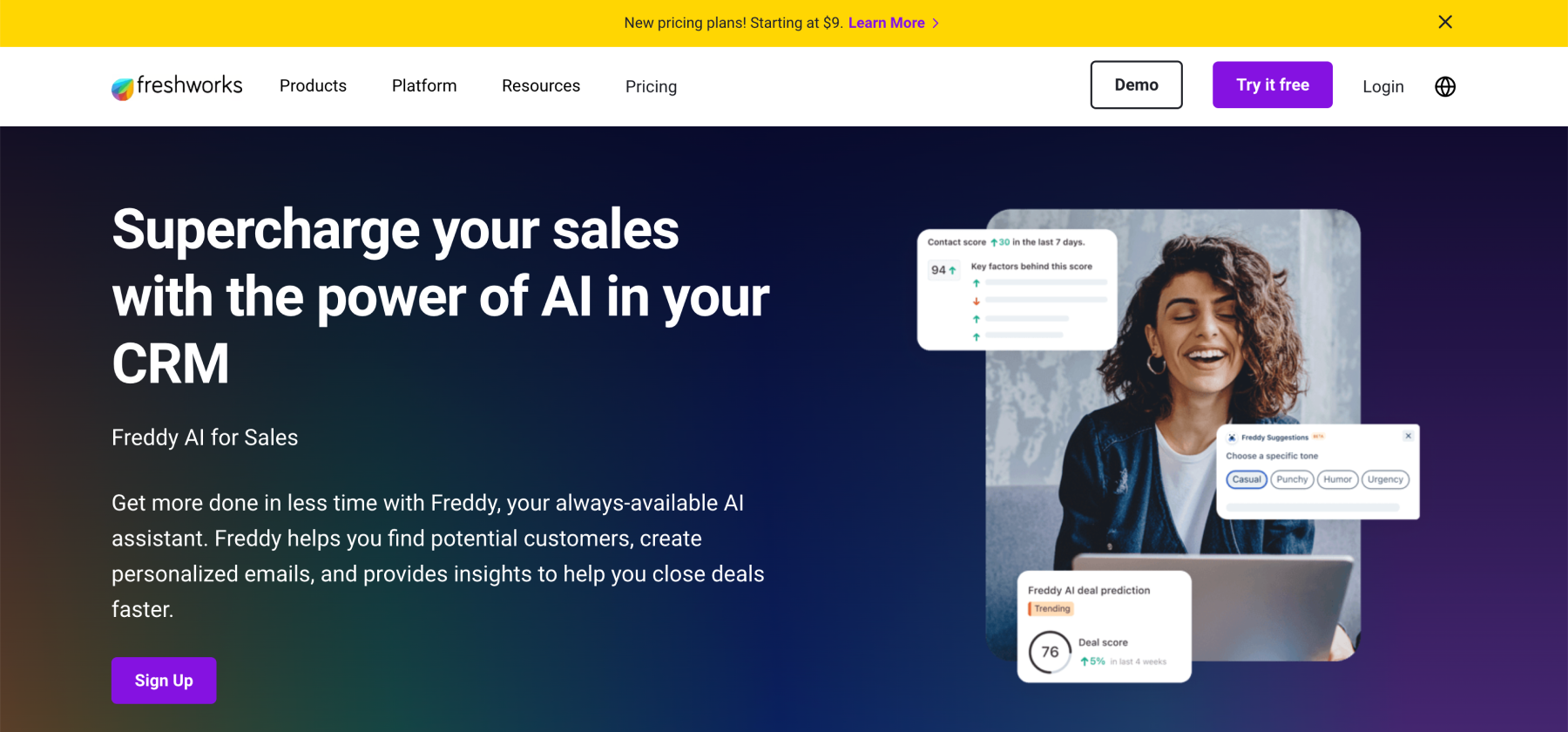
Best for: Freshworks ecosystem users needing integrated customer service automation
Strengths:
- Native integration with Freshworks suite
- Good balance of features and usability
- Reasonable pricing within Freshworks ecosystem
- Solid workflow automation capabilities
Limitations:
- Best value requires full Freshworks commitment
- Limited third-party integrations outside ecosystem
- Less advanced NLP compared to specialized platforms
-
Tidio - SMB-Focused Live Chat + AI

Best for: Small to medium businesses needing basic chatbot functionality with live chat
Strengths:
- Very easy setup and management
- Affordable pricing for small businesses
- Good live chat integration
- Mobile-friendly interface
Limitations:
- Limited advanced AI capabilities
- Basic integration options
- Not suitable for enterprise requirements
- Minimal workflow automation
Drift - Sales-Focused Conversational Marketing
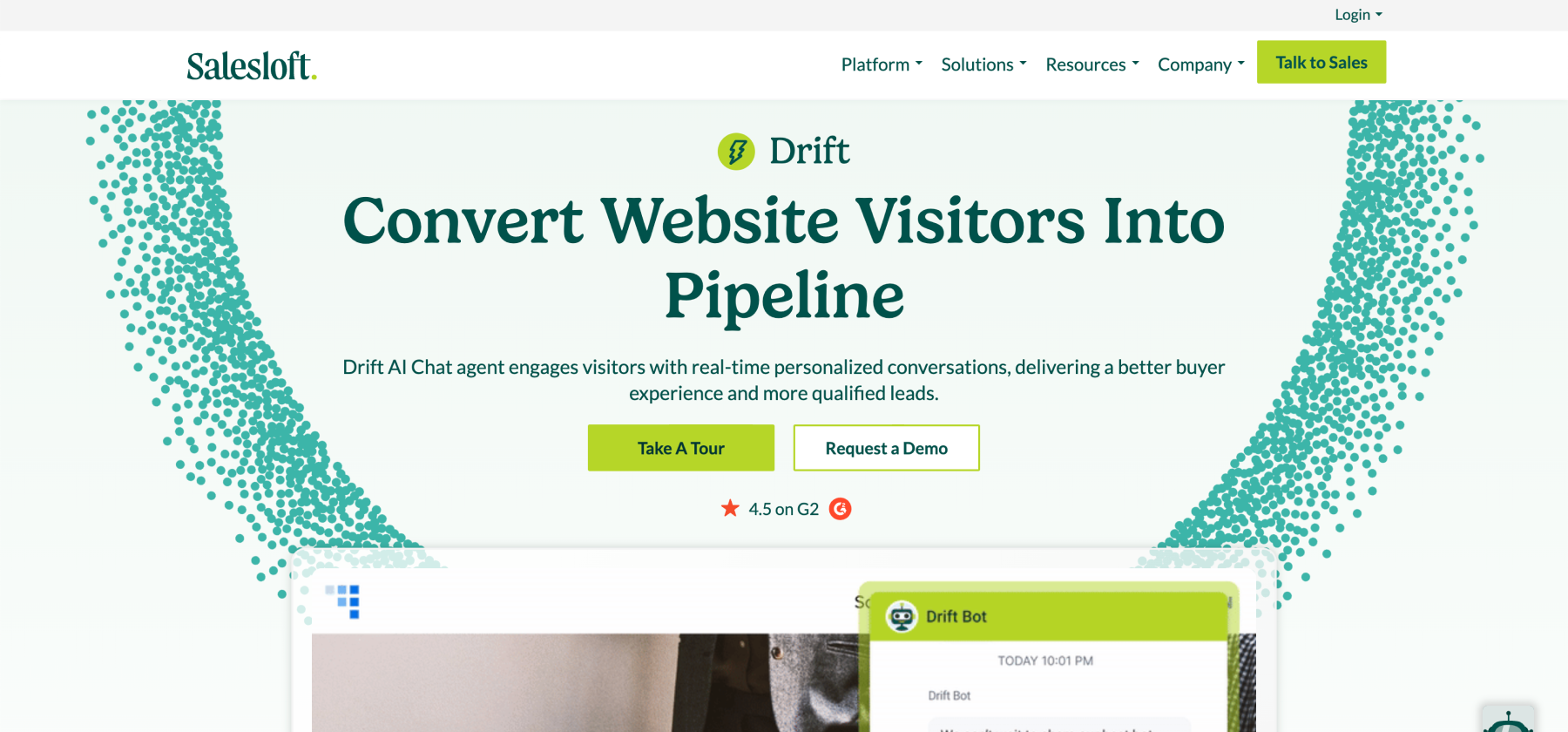
Best for: B2B companies focusing on lead generation and sales automation
Strengths:
- Excellent for sales and marketing use cases
- Strong lead qualification capabilities
- Good integration with sales tools
- Conversation-driven marketing features
Limitations:
- Limited customer service automation features
- Expensive for non-sales use cases
- Less suitable for post-sale support scenarios
- Complex pricing structure
Yellow.ai - Enterprise Conversational AI Platform
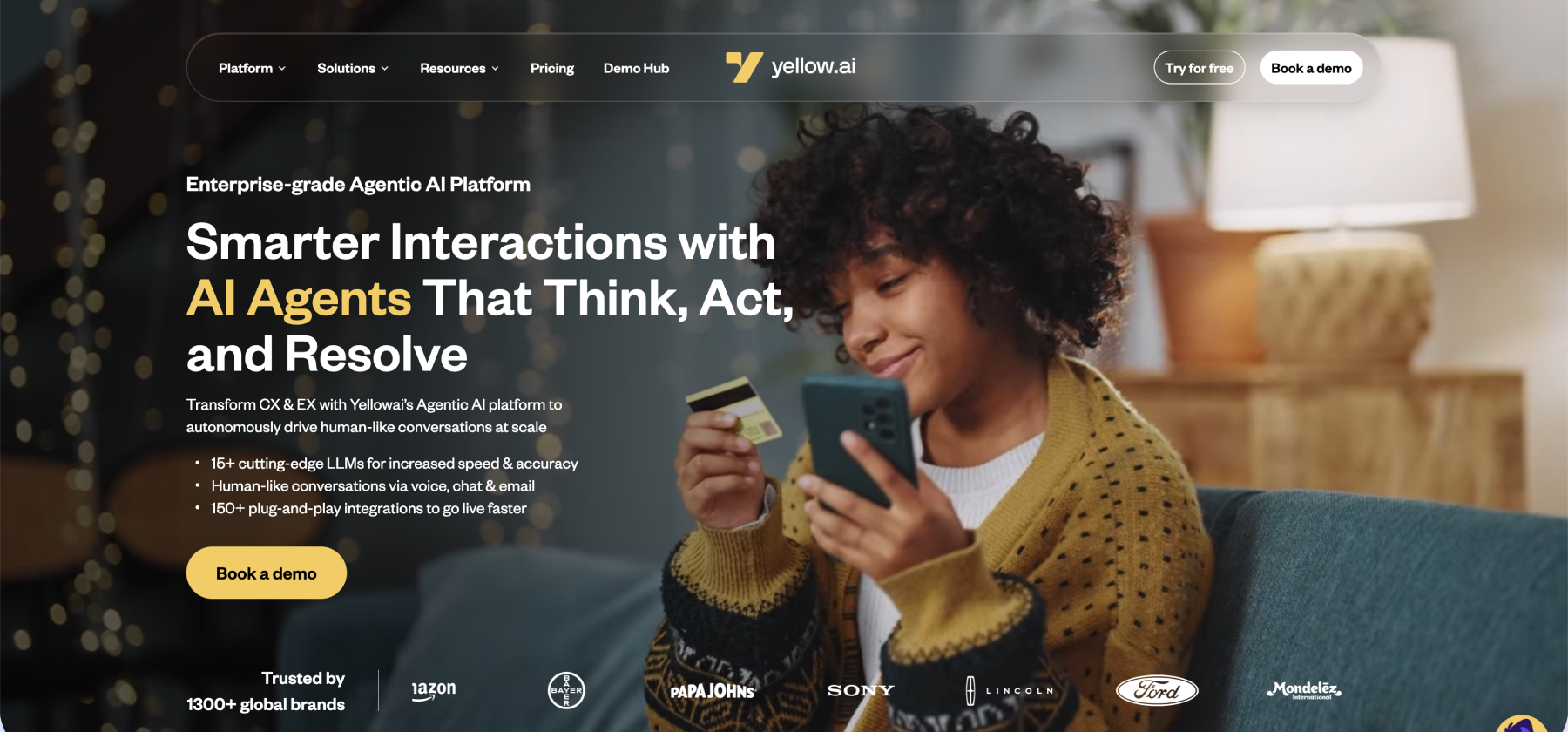
Best for: Large enterprises needing comprehensive conversational AI across multiple use cases
Strengths:
- Comprehensive enterprise platform
- Advanced NLP and AI capabilities
- Extensive customization options
- Multi-language support
- Industry-specific solutions
Limitations:
- Complex implementation and setup
- Higher cost and longer deployment timelines
- May be over-engineered for simple use cases
- Requires significant technical resources
Kore.ai - Enterprise Process Automation Platform
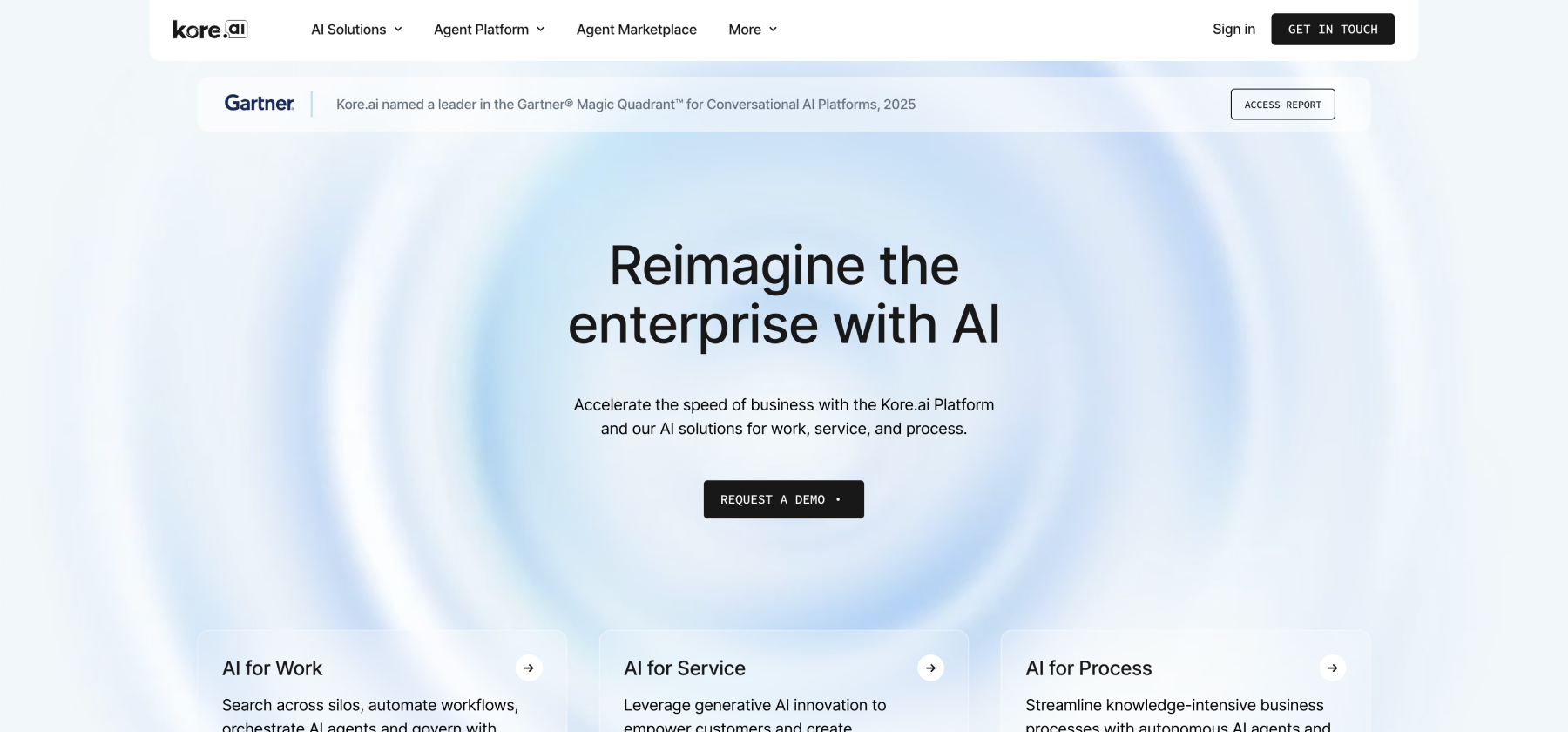
Best for: Large enterprises focusing on complex process automation through conversational interfaces
Strengths:
- Advanced workflow automation capabilities
- Enterprise-grade security and compliance
- Extensive integration options
- Strong analytics and reporting
Limitations:
- Very complex setup and management
- High cost and resource requirements
- Long implementation timelines
- Steep learning curve
Ada - Customer Service AI Platform
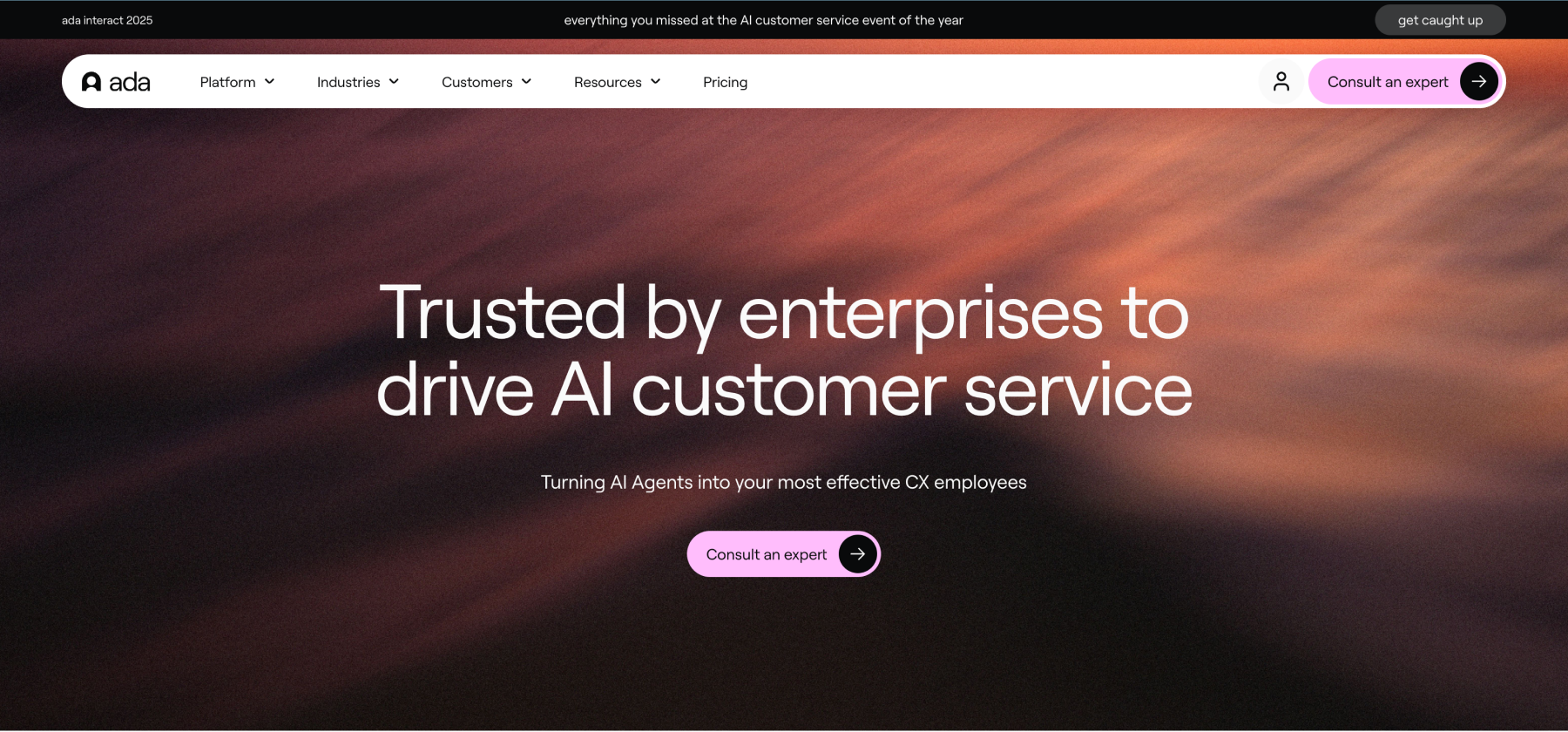
Best for: Customer service teams needing sophisticated AI automation with brand control
Strengths:
- Advanced conversation workflow tools
- Strong brand customization options
- Good escalation and routing capabilities
- Comprehensive analytics
Limitations:
- Higher pricing for advanced features
- Complex setup for advanced workflows
- Limited integration options compared to some competitors
Zendesk Chat - Helpdesk-Integrated Chatbot
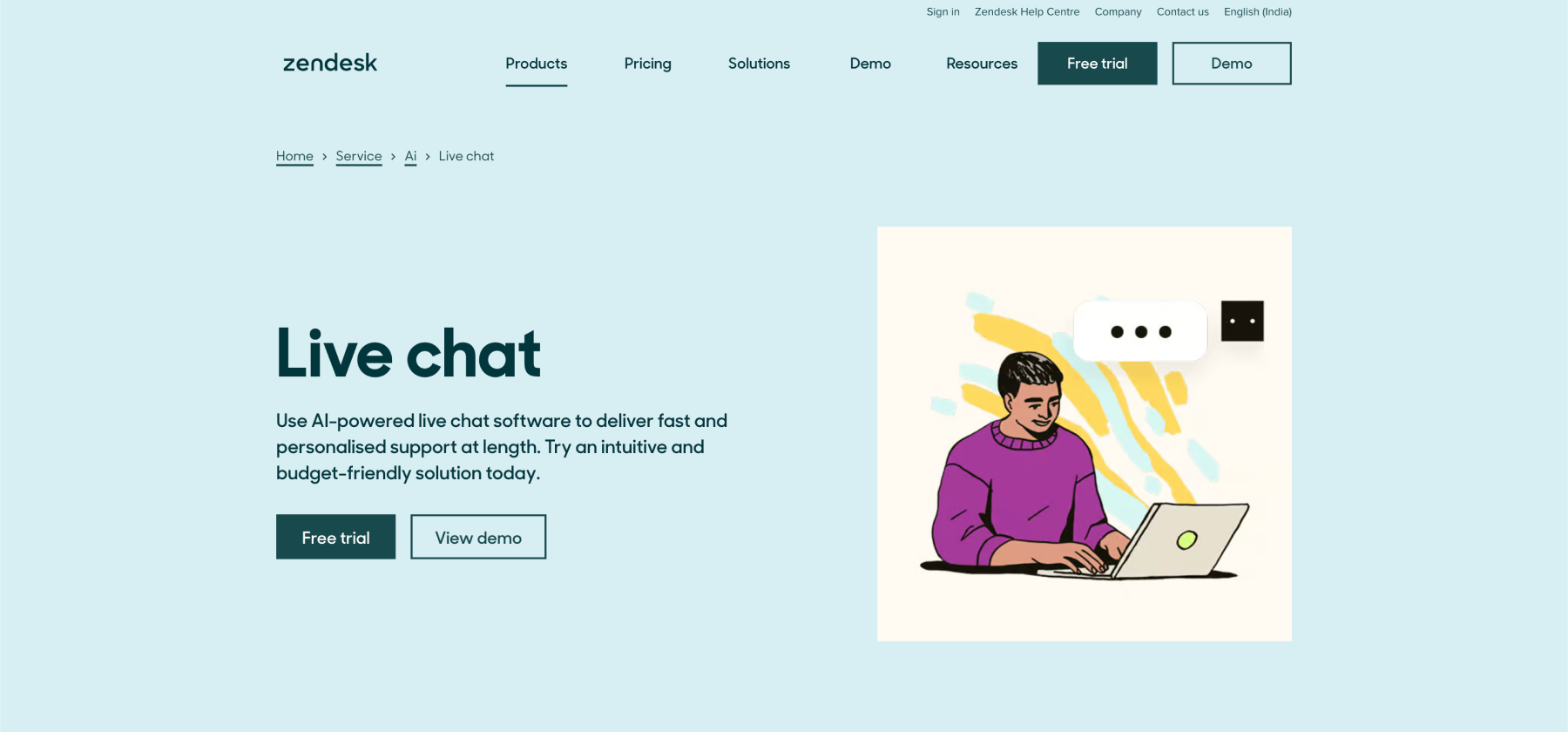
Best for: Existing Zendesk users wanting integrated chatbot capabilities
Strengths:
- Native integration with Zendesk suite
- Familiar interface for Zendesk users
- Good ticketing system integration
- Comprehensive reporting
Limitations:
- AI features feel supplementary rather than core
- Expensive when scaling
- Limited advanced conversation capabilities
- Complex pricing structure
Ema Chat - Conversational AI for Customer Support

Best for: Mid-market companies needing balanced AI capabilities with reasonable pricing
Strengths:
- Good balance of features and pricing
- Decent NLP capabilities
- Reasonable setup complexity
- Multi-channel support
Limitations:
- Less advanced than enterprise platforms
- Limited integration ecosystem
- Newer platform with smaller user base
Key Use Cases for AI Customer Service Chatbots
FAQ Deflection and Knowledge Base
Goal: Handle routine questions instantly while maintaining accuracy and brand voice
Best Platforms: Chatbase (simple), Ayudo (advanced), Ada (branded)
Key Features Needed:
- Natural language understanding for question variations
- Easy knowledge base integration and updates
- Fallback options for unknown queries
- Analytics on common questions and gaps
Success Metrics:
- High deflection rate for routine inquiries (Ayudo reports over 60% improvement in deflection rates)
- Significantly reduced response times
- Improved customer satisfaction scores
- Decreased volume of repetitive tickets
Lead Qualification and Sales Support
Goal: Capture and qualify leads while providing pre-sales support
Best Platforms: Drift, Ayudo, Yellow.ai
Key Features Needed:
- Lead capture forms and qualification logic
- CRM integration for lead management
- Sales team handoff capabilities
- Conversation routing based on intent
Success Metrics:
- Increased lead capture rate
- Higher quality leads passed to sales
- Faster response times for sales inquiries
- Improved conversion rates
Order Support and E-commerce Assistance
Goal: Help customers with order status, returns, and product information
Best Platforms: Ayudo, Ada, Yellow.ai
Key Features Needed:
- E-commerce platform integration
- Order lookup and status updates, abandoned cart reachouts
- Return and refund process automation
- Product recommendation capabilities
Success Metrics:
- Reduced order-related support tickets
- Faster resolution of order inquiries
- Increased customer satisfaction
- Improved upsell/cross-sell opportunities
Technical Support and Troubleshooting
Goal: Guide customers through common technical issues and escalate complex problems
Best Platforms: Ayudo, Kore.ai, Ada
Key Features Needed:
- Step-by-step troubleshooting workflows
- Integration with knowledge bases and documentation
- Escalation to technical support agents and external teams
- Conversation history and context preservation
Success Metrics:
- Higher first-contact resolution rates
- Reduced technical support ticket volume
- Improved customer satisfaction
- Faster resolution times (Ayudo reports 42% improvement in resolution speed)
Abandoned Cart Recovery (Voice + Chat)
Goal: Recover lost revenue by re-engaging customers who abandoned their carts
Best Platforms: Yellow.ai (voice-enabled), Ayudo (multi-channel), Ada (personalized follow-up)
Key Features Needed:
- Real-time cart abandonment detection
- Automated outbound voice calls or chat messages
- Personalized discount or incentive delivery
- Integration with CRM and e-commerce platform for context
- A/B testing for offer effectiveness
Success Metrics:
- Higher cart recovery rate (conversion lift after outreach)
- Increased revenue from abandoned carts
- Improved ROI on retargeting efforts
- Positive customer feedback on follow-up experience
Implementation Best Practices
Pre-Implementation Planning
Define Success Metrics
- Establish baseline measurements for response time, resolution rate, and customer satisfaction
- Set realistic deflection targets based on your current ticket volume
- Create measurement frameworks for ongoing optimization
- Plan for both quantitative and qualitative success indicators
Content Audit and Preparation
- Review existing FAQ documents and knowledge base content including uploading docs, PDFs, Google docs, Notion, Freshdesk, Zendesk.
- Scraping website URL
- Identify the most common customer inquiries and pain points
- Organize content by customer journey stages and intent categories
- Plan for ongoing content maintenance and optimization
Integration Requirements Assessment
- Map current customer service tech stack and integration needs
- Identify critical data sources (CRM, order management, knowledge base)
- Plan for single sign-on (SSO) and security requirements
- Assess bandwidth and technical resource needs
Deployment Strategy
Phase 1: Foundation Setup (Week 1)
- Configure basic chatbot flows for top 10 most common inquiries
- Set up core integrations with existing systems
- Establish escalation procedures to human agents
- Train initial AI models with historical data
Phase 2: Testing and Refinement (Week 2-3)
- Deploy to limited customer segment (10-20% of traffic)
- Monitor conversation quality and success rates
- Gather feedback from both customers and support agents
- Refine flows based on real interaction data
Phase 3: Full Deployment and Optimization (Week 4+)
- Expand to full customer base
- Implement advanced workflows and automation
- Add multi-channel deployment if applicable
- Continuously optimize based on performance data
Content and Conversation Workflow Design Best Practices
Conversation Flow Design
- Start with simple, linear flows and gradually add complexity
- Design clear fallback options for misunderstood queries
- Create natural conversation patterns that match your brand voice
- Build in confirmation steps for important actions
Knowledge Management
- Use consistent terminology and formatting across all content
- Implement version control for content updates
- Create feedback loops for continuous improvement
- Plan for multilingual support if needed
Escalation Strategy
- Define clear criteria for when to escalate to human agents
- Implement auto-escalation to escalate L0 tickets to the backend team which allows another AI agent with different skills/tools/instructions to respond to the escalated ticket.
- Provide complete conversation context during handoffs
- Set expectations with customers about response times
- Train support agents on AI handoff procedures
ROI Calculation Framework
Cost Savings Analysis
Formula: Annual Savings = (Current Support Costs × Deflection Rate) - Platform Costs
Key Metrics to Track
Efficiency Metrics
- Deflection Rate: Well-implemented chatbots can achieve significant automation of routine inquiries (Ayudo reports over 60% deflection rate improvement)
- First Contact Resolution: Aim for measurable improvement in resolution rates
- Response Time: Instant responses for automated interactions
- Cost Per Interaction: Track reduction in support costs (Ayudo reports 25% cost reduction per resolution)
Quality Metrics
- Customer Satisfaction: Maintain or improve current scores
- Conversation Success Rate: Track completed vs. escalated conversations
- Agent Productivity: Monitor impact on human agent workload
- Escalation Quality: Ensure escalated conversations are truly complex
Frequently Asked Questions
Implementation & Setup
Deployment time varies significantly by platform complexity. Simple solutions like Chatbase can be live in minutes, while platforms like Ayudo can have workflows running in under 60 minutes. Enterprise platforms like Kore.ai may take weeks or months for full deployment.
Modern platforms increasingly offer no-code solutions. Chatbase, Tidio, and Ayudo provide user-friendly interfaces that business users can manage. However, complex enterprise deployments may still require technical support.
Focus on your core systems first: CRM, helpdesk, knowledge base, and e-commerce platform. Ensure the chatbot can access customer data, order information, and support history for personalized interactions.
Performance & ROI
Deflection rates vary significantly based on use case complexity and implementation quality. For reference, Ayudo reports over 60% improvement in deflection rates for routine inquiries, though results will depend on your specific customer service scenarios and implementation approach.
Key metrics include deflection rate, customer satisfaction, response time, cost per resolution, and escalation resolution quality. Establish baselines before implementation and track improvements over time.
Customer Experience
Customer acceptance varies based on implementation quality and use case. When chatbots provide immediate, accurate responses and seamlessly escalate complex issues, acceptance rates tend to be higher. Transparency about AI interaction and easy access to human agents improves customer experience.
Choose platforms with strong customization options like Ada or Ayudo. Develop clear brand guidelines for chatbot conversations and regularly review and refine responses to maintain consistency.
Technical Considerations
Essential features include data encryption, SOC 2 compliance, role-based access control, audit logs, and secure integrations. Enterprise platforms typically offer comprehensive security features.
Some platforms like Yellow.ai offer strong multi-language capabilities, while others may require additional configuration. Consider your customer base and prioritize platforms with native support for your required languages.
Choosing the Right AI Chatbot Platform
Small Businesses
(Under 50 employees)
Chatbase or Tidio
- Quick setup and deployment
- Affordable pricing
- Easy management
- Good for basic FAQ deflection
Growing Companies
(50-200 employees)
Ayudo or Freddy (Freshchat)
- Balanced feature set and complexity
- Room to grow with your business
- Good integration options
- Professional support
Large Enterprises
(200+ employees)
Ayudo, Yellow.ai, or Kore.ai
- Advanced workflow automation
- Enterprise-grade security
- Extensive integration capabilities
- Dedicated support and professional services
Sales-focused
Drift
- Lead qualification and routing
- CRM integration
- Sales team collaboration
- Conversation analytics
Existing Intercom users
Fin.ai, Ayudo
- Native platform integration
- Unified customer experience
- Leverages existing setup
- Advanced conversation handling
Document-based Q&A
Chatbase
- Upload documents for instant bot
- Simple setup process
- Cost-effective solution
- Good for knowledge base automation
Comprehensive customer service
Ayudo or Ada
- Multi-channel support
- Advanced workflow automation
- Seamless human handoff
- Robust analytics and insights
Complex process automation
Kore.ai, Ayudo
- Enterprise-grade automation
- Multi-step workflow handling
- Advanced integration capabilities
- Customizable business logic
Get Started
The AI chatbot landscape offers solutions for every business size and complexity level. Success depends on choosing a platform that matches your current needs while providing room for growth. Focus on platforms that offer strong natural language processing, easy integration with your existing systems, and clear escalation paths to human agents.
For most businesses, we recommend starting with platforms that offer quick deployment and gradual complexity scaling, such as Ayudo for comprehensive needs or Chatbase for simple FAQ automation for deflection. Enterprise organizations should consider platforms with advanced workflow capabilities and extensive customization options.
Ready to get started?
Contact our team for a personalized demo and see how the right AI chatbot can enhance your customer experience while reducing operational costs.
This guide was last updated in 2026. For the most current information on AI chatbot platforms and implementation strategies, consult with solution providers directly.





